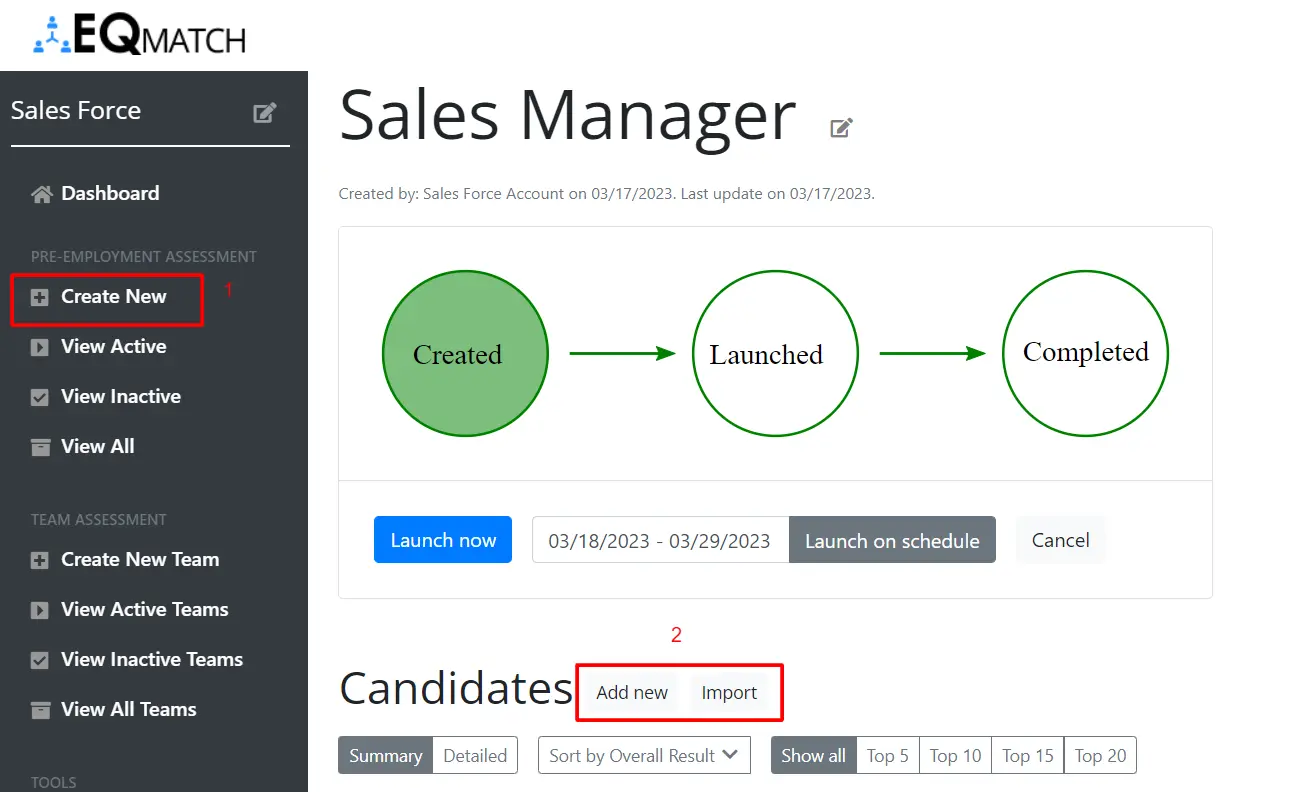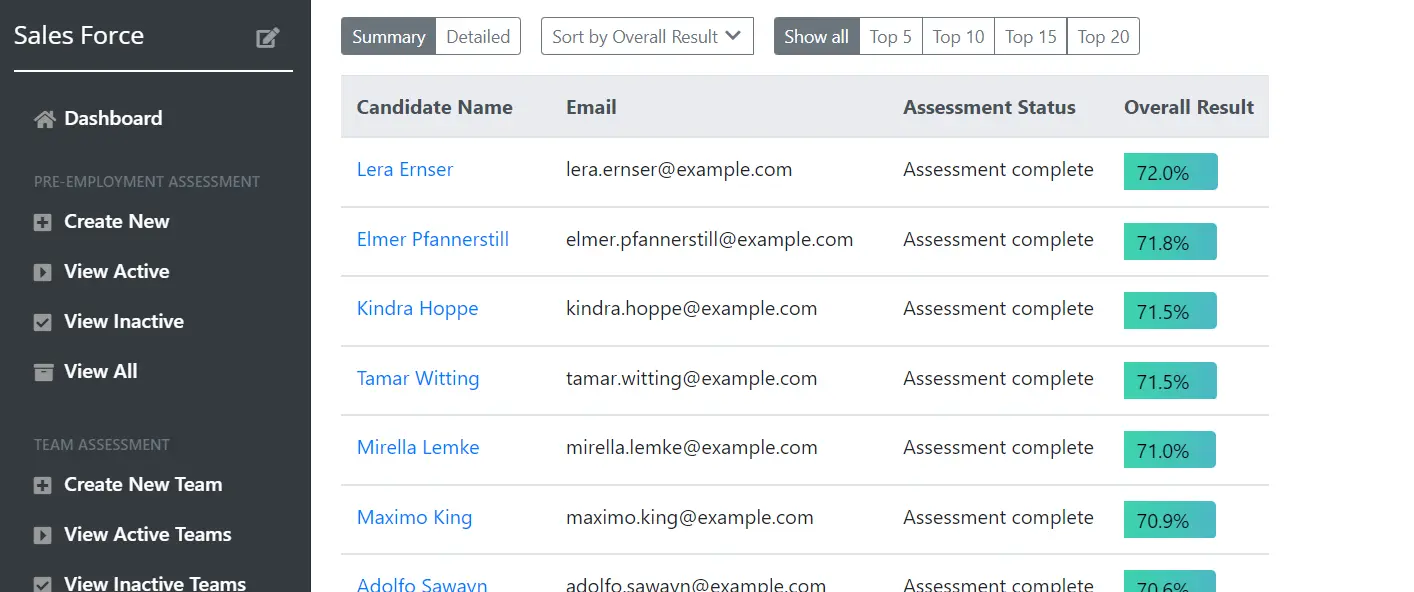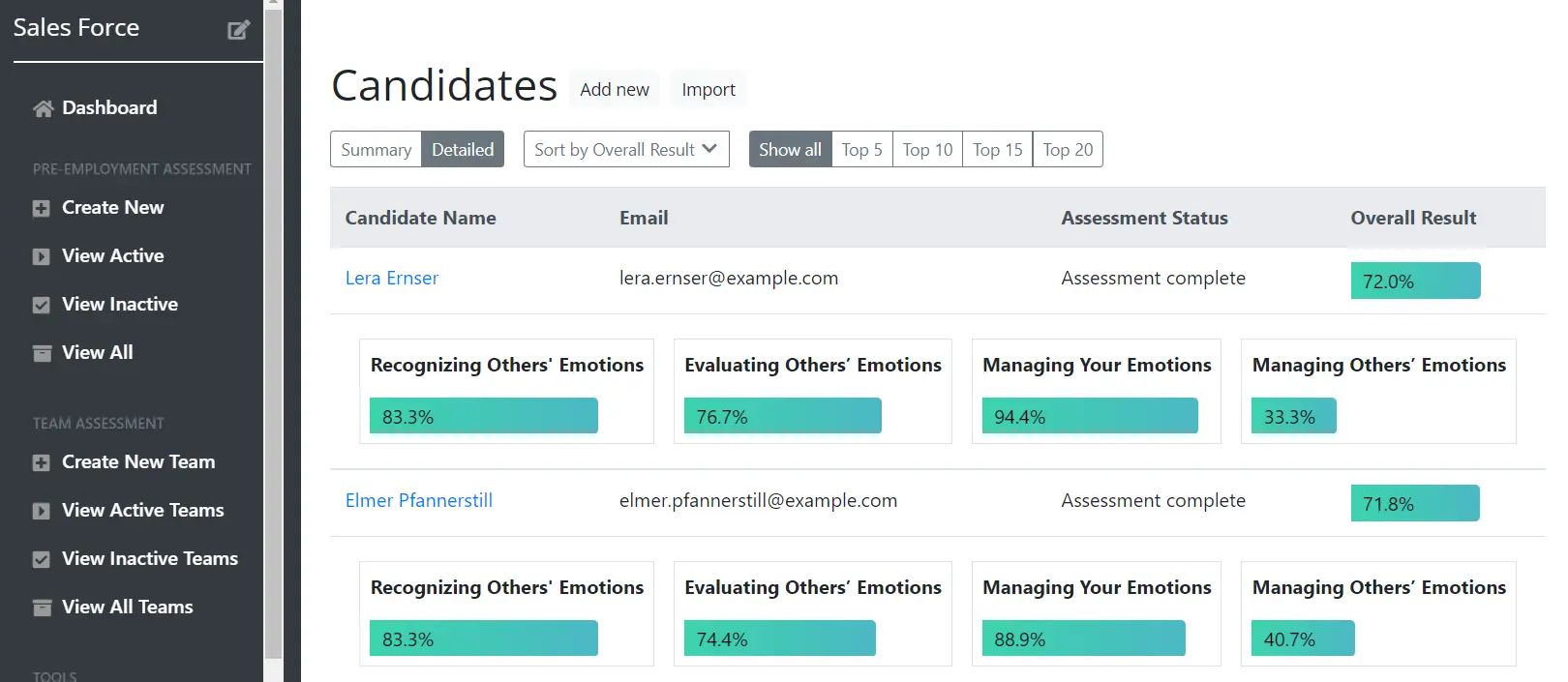Cashflow is the lifeline of a business.
And without the sales department, one cannot expect a business to generate revenue. Sales professionals play a critical role in keeping the lights on for a business.
The Sad Fact…
The average sales rep tenure is 18 months.
Furthermore, it takes, on average, just over 3 months to bring a new salesperson to speed. On average, filling a B2B sales position takes around 60 days.
Assuming a two-week resignation notice, businesses would have more than 46 days working with limited human capital.
Did you know that a 5% increase in sales rep attrition can push selling costs up by 6%?
The difference between a 5% attrition rate and 25% means an increase of over 50% in cost to sell and revenues drop by 20%. (Source)
In short, replacing a sales rep significantly affects the bottom line of your business.
Before we talk about emotional intelligence for sales success, let’s dive into the causes of employee turnover in the sales department.
Sales Turnover: Causes
Work-life Balance & Organizational Culture
We are witnessing massive growth in job hopping. People are changing jobs to seek a better work-life balance. The company culture has a huge impact on employee turnover.
56% of job seekers agree they would not consider working for a company that has values they do not agree with.- Qualtrics
HR leaders should align hiring with their company goals to reduce turnover.
Poor Employee Engagement
79% of employees are disengaged at work. Disengaged employees are less likely to be motivated to perform their job duties effectively.
The consequence?
Decreased productivity, lower sales performance, and decreased revenue!
When employees feel unappreciated, undervalued, or unsupported in their roles, the result is job dissatisfaction. This, in turn, promotes absenteeism, decreased job commitment, and ultimately, turnover.
Sales employees who feel disconnected from their work and their team may also feel less motivated to stay with the employer long-term. This could be particularly true if they feel that they are not receiving adequate training or support to succeed in their roles.
Poor employee engagement can lead to a negative workplace culture, where employees may feel unsupported, disrespected, or undervalued. This can create a toxic environment that drives talented sales employees away from the company and towards competitors who offer a more positive workplace culture.
Businesses should prioritize strategies to improve employee engagement and support their sales teams to reduce this risk.
Employee Burnout
Organizations around the world are experiencing an increase in sales burnout.
Post-pandemic, several businesses have deployed the remote work model. While the remote work model offers a high degree of flexibility, it has led to employees working longer hours.
Sales employees are particularly susceptible to burnout due to the high-pressure nature of their role and the need to consistently meet sales targets. Due to burnout, sales professionals may become disengaged from their work, lose motivation, and feel less committed to their job.
As a result, their productivity goes downhill. This means lower sales performance and decreased revenue for the company.
Burnout can also lead to increased absenteeism and presenteeism, where employees show up to work but are unable to perform at their best. The result is increased job dissatisfaction and decreased job commitment. This could also result in an increased turnover as employees seek a better work-life balance and greater job satisfaction.
Burnout has been associated with physical and mental health issues, including anxiety, depression, and physical exhaustion.
These issues can impact employees’ ability to perform their job duties effectively and can increase the likelihood of turnover as employees seek treatment and time off to recover.
Misalignment with Leadership
The quality of leadership at a business has a big impact on sales employee turnover.
When sales employees do not feel aligned with the vision, mission, and goals of the organization, they may become disengaged from their work, lose motivation, and feel less committed to their job.
This lack of alignment can result in decreased productivity, lower sales performance, and decreased revenue for the company. Sales employees may also become frustrated and disenchanted with the company’s direction, leading to increased job dissatisfaction and decreased job commitment.
Misalignment with leadership can lead to a lack of trust between sales employees and their leaders. If sales employees do not feel that their leaders are supportive, transparent, or authentic, they may become skeptical of their intentions and lose faith in the company’s direction.
This can create a toxic work environment and increase the likelihood of turnover as employees seek more positive and supportive workplaces. Another consequence of misalignment with leadership is a lack of clarity around job responsibilities and expectations.
If sales employees do not understand their role in the company’s vision and goals, they may feel uncertain about their job security and future prospects.
This leads to increased turnover as they seek more clarity and stability in their careers.

How to reduce Sales Turnover in Your Organization?
While it is almost impossible to eliminate sales turnover, you can certainly take steps to improve employee retention.
Find the Right Talent
Each business has its own way of hiring, but it’s important to have a thoughtful and selective process.
Hiring employees who not only have the right skills but also share the cultural and behavioral values of the organization, can lead to greater success. Human Resources leaders can use an emotional intelligence assessment to assess a candidate’s personality and character.
Promote Retention from Day One
Retention efforts should start on an employee’s first day.
However, only 12% of U.S. employees feel that their company does a good job of onboarding. Business leaders, including HR, should focus on improving the onboarding process for employees. They should ensure that new hires understand the company’s mission and how they can contribute.
Recognize and Reward Employees
Employee recognition and appreciation are crucial for maintaining a positive work environment. This can be encouraged through HR training for managers.
Happy employees tend to be more productive. Hence, managers should acknowledge and congratulate them when they go above and beyond.
Provide a Clear Career Path
Investing in and promoting current personnel is a key part of retaining them. Employees should have a sense of career growth and development within the organization to avoid feeling stagnant or seeking other opportunities.
Regular meetings with managers to discuss goals and how the company can help achieve them can be beneficial.
Encourage Work-Life Balance
Benefits and perks are often a top consideration for job seekers. Offering unique perks such as extended parental leave or travel stipends, as well as flexible work arrangements, can help companies stand out and promote a healthy work-life balance.
Create Learning and Development Programs
Learning and development programs not only benefit employees, but also the organization as a whole. Companies can establish clear protocols and allow employees to pursue areas of interest, such as attending conferences or classes.
It’s important to ensure that the criteria for these programs are fair, clear, and well-understood by all employees.

Why Is Emotional Intelligence Important in Sales?
Salespeople with high emotional intelligence have a 15% higher close rate than those with low emotional intelligence (HBR). And high EQ people have a 20% lower turnover rate than those with low emotional intelligence. (SalesForce)
Emotional Intelligence (EI) is a critical component of success in the workplace. High EI is associated with better job performance, stronger leadership skills, and greater job satisfaction.
Sales professionals with high EI are better equipped to connect with customers and understand their needs. They can better manage the emotional aspects of the sales process, such as rejection and objections, and are more likely to build lasting relationships with customers.
Studies have shown that sales professionals with high Emotional Intelligence tend to outperform their peers. According to a study, salespeople with high EI generate 50% more sales than those with low EI. Moreover, they have higher levels of customer satisfaction and are more likely to close deals.
So how exactly does high Emotional Intelligence lead to improved sales performance?
Self-Awareness
“Self-awareness is the ability to focus on yourself and how your actions, thoughts, or emotions do or don’t align with your internal standards…”
A salesperson with a high degree of self-awareness is less likely to annoy or irritate a potential customer with their own negative emotions.
Also, they are more likely to handle disappointment and rejection faster than sales reps who have lower levels of self-awareness.
Self-Regulation
Self-regulation is the ability to control and adapt one’s own emotions to the situation or to avoid disrupting others.
Sales reps who can’t self-regulate are likely to bring their negative emotions such as fear, anxiety, or irritation to sales conversations.
As a result, they are unable to adapt their behavior to their job requirement. Over the long term, such employees are less likely to be enthusiastic and motivated; thus leading to lower productivity.
Social Skills
Social skills encompass social awareness, building rapport and meaningful connections, and maintaining long-term relationships.
Since sales is highly dependent on building relationships and trust, sales reps with strong social skills “read the room” and adapt to the situation better than sales reps with poor social skills.
As a result, sales reps with strong social skills bring in more business in the long term.
Empathy
Empathy is one of the most important aspects of Emotional Intelligence (EQ).
Empathy means putting yourself in another person’s shoes. Empathy helps us become more aware of the feelings and emotions of other people. An empathetic salesperson can assess a prospect or customer better.
Such an employee would be able to adapt their approach and steer conversations in the right direction. Sales is about understanding the needs, pain points, and goals of the prospect, and helping them solve those in the most effective way.
An empathetic salesperson can better visualize the customer experience to better understand their needs and pain points. This would help the sales rep connect better with the customer.
Motivation
Enthusiasm and motivation play an important role in sales productivity.
Sales reps with stronger motivation are more likely to be more productive. Such professionals handle rejection better and are open to upskilling and training.
Utilizing Emotional Intelligence in sales leads to more successful sales interactions and ultimately more closed deals. It results in higher levels of customer satisfaction and increased customer loyalty.
Buyers/clients are more likely to do business with companies that have salespeople who are able to connect with them on a personal level. Incorporating Emotional Intelligence in sales can lead to a more positive and supportive work environment.
For these reasons, it is essential for business leaders to consider implementing the right emotional intelligence tools in their sales teams.

Emotional Intelligence in the workplace
Sales professionals with high EI are better positioned to handle the emotional aspects of the sales process, such as rejection and objections, and are more likely to build lasting relationships with customers.
An emotional Intelligence Assessment can help organizations identify high-potential employees and create targeted training and development plans to support their growth.
Let’s try to understand how an emotional Intelligence Assessment can improve sales performance. We will also discuss how to measure and implement an Emotional Intelligence Assessment, and best practices for utilizing this tool to improve sales performance.
Emotional Intelligence for Sales Success
EQ assessments are a valuable tool for identifying salespeople with high Emotional Intelligence (EI).
An emotional intelligence assessment like EQMatch measures one’s ability to identify and manage emotions, as well as their ability to read and respond to the emotions of others. Using such an assessment, businesses can identify salespeople who are likely to excel in customer-facing roles and ultimately drive sales growth.
Here is how you can leverage EQMatch Emotional Intelligence Assessment for hiring…
Once you create an account with EQMatch, you would create a new assessment. The next step is to add the candidates to the solution. (See image below)

After you send the assessment invite to the candidates, and they complete the assessment, your EQMatch dashboard would populate with the assessment results.
You can either look at the summary view:

Or get more granular with the detailed view:

This detailed view of an applicant across the four quadrants of EQ can help HR leaders make more informed hiring decisions.
Emotional Intelligence Assessment Advantages
Business Growth
By identifying salespeople with high EI, businesses can build a team of individuals who are better equipped to connect with customers, understand their needs, and ultimately drive sales growth.
Additionally, salespeople with high EI tend to be more resilient and better equipped to handle the emotional aspects of the sales process, such as rejection and objections.
Diverse Workplace
Studies suggest that people with high EI tend to be more open-minded and accepting of others. By prioritizing EI in the hiring process, businesses can create a more diverse and inclusive workplace culture.
Training & Development
Emotional Intelligence Assessment can also be a valuable tool for training and development purposes. By identifying areas for improvement, businesses can provide targeted training to help salespeople develop their EI skills. For example, if a salesperson struggles with managing their own emotions, they may benefit from training in mindfulness or emotional regulation techniques.
Leadership Development
Businesses can use Emotional Intelligence Assessment to identify potential leadership candidates. There is ample research suggesting that people with high EI tend to make better leaders, as they are better able to manage the emotions of others and foster positive relationships with their team members.

Implementing Emotional Intelligence Assessment for Sales Success
Let’s talk about the steps to take when implementing Emotional Intelligence Assessment in the workplace:
Goals & Objectives
Before implementing an emotional Intelligence Assessment, make sure you have outlined the goals and objectives of the program. This may include improving sales performance, building a more diverse and inclusive workplace culture, or identifying potential leadership candidates.
Choosing the right Assessment
There are dozens of emotional Intelligence Assessment tools available. Make sure to choose the one that best fits your organization’s needs.
Here are a few guides to help you learn more about these tools:
Myers Briggs Personality Test vs EQMatch
Training HR staff and managers
Business leaders should receive training on how to administer Emotional Intelligence Assessments and how to interpret the results. Managers should also be trained on how to provide feedback to salespeople and how to develop targeted training plans based on the results.
Communicate the program to salespeople
It is important to communicate the purpose and benefits of an emotional intelligence assessment to the sales team. Department leaders should emphasize how the program can help sales reps become more effective in their roles.
Analyze Results
HR managers can team up with Sales leaders to analyze the assessment results.
They can together identify salespeople with high Emotional Intelligence and areas for improvement. This information can then be used to develop targeted training plans and to identify potential leadership candidates.
Develop a training and development plan
Based on the results of the assessments, targeted training plans should be developed for salespeople who need to improve their EI skills. This may include workshops, coaching, and mentoring programs.
Monitor and evaluate the program
HR leaders should monitor the effectiveness of the program over time and make adjustments as needed. Regular evaluation and feedback can help ensure that the program is meeting its goals and objectives.
Final Thoughts: Emotional Intelligence for Sales Success
EI could play a big role in helping with sales success. Using the right emotional Intelligence assessment can help managers identify salespeople with high EI. It can also be used to identify potential leadership candidates and encourage a culture of emotional intelligence throughout the organization.
EQ training and development programs can help businesses improve their sales effectiveness and create a more emotionally intelligent workplace culture.
FAQS
Here are the frequently asked questions related to emotional intelligence for sales success:
Can Emotional Intelligence Assessment be used for other departments besides sales?
Yes, an Emotional Intelligence Assessment can be used for other departments besides sales, such as leadership development, team building, and conflict resolution.
Is Emotional Intelligence Assessment a replacement for other sales performance improvement strategies?
No, an Emotional Intelligence Assessment should be used in conjunction with other sales performance improvement strategies, not as a replacement.
Why is Emotional Intelligence important in sales?
Emotional Intelligence is important in sales because it can help salespeople understand and connect with their customers on a deeper level, leading to more effective sales interactions.
How can Emotional Intelligence assessments benefit the sales team?
Emotional Intelligence assessments can benefit the sales team by identifying areas for improvement, promoting self-awareness and empathy, and enhancing communication and relationship-building skills.
What are some examples of Emotional Intelligence assessment tools?
Examples of Emotional Intelligence assessment tests include the EQMatch test, EQ-i 2.0, MSCEIT, and the Mayer-Salovey-Caruso Emotional Intelligence Test.
How can HR decision-makers use Emotional Intelligence assessments to improve sales performance?
HR decision-makers can use Emotional Intelligence assessments to improve sales performance by identifying salespeople with high EI, providing targeted training and development programs, and promoting a culture of emotional intelligence throughout the organization.


No responses yet